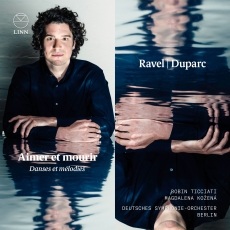Robin Ticciati & DSO - Ravel & Duparc: Aimer et mourir - Gramophone
Robin Ticciati’s beautiful but uneven first disc with Berlin’s Deutsches Symphonie-Orchester, pairing Debussy with Fauré, was released in October 2017 (A/17) to coincide with his appointment as the orchestra’s music director. A year on we now have its successor, which places Duparc alongside Ravel and is in every respect a significant achievement. In part, one suspects, this is a reflection of Ticciati’s deepening relationship with the orchestra itself, though it must also be added that his occasionally considered way with the late 19th/early 20th-century French repertory, which made his La mer seem fractionally too deliberate, suits this second pair of composers down to the ground.
The title, ‘Aimer et mourir’, isn’t entirely accurate. No one dies here, unless one assumes that the absent soldier of ‘Au pays où se fait la guerre’ has been killed in action, which neither the text nor the music supports. The prevailing mood of the first two thirds of the disc – the Daphnis Suite, the Duparc mélodies sung by Magdalena Kožená – is one of heady sensuality, rooted in careful appraisal of sonority and texture and in a fondness for, and an ability to sustain, slower than usual speeds.
The balance at the start of Daphnis is weighted away from the woodwind towards the lower strings, which awaken somnolently in the depths before rising majestically upwards. The Pantomime’s flute solo unfolds with languid torpor over what feels like near-stasis in the strings, and the Danse générale is all the more exciting for being taken steadily, accumulating momentum as it goes, rather than rushed or scrambled.
Similar qualities are apparent in Ticciati’s Duparc. He and Kožená take well over four minutes for ‘Chanson triste’, when most performances last between two and three, and the dark strings and slowly evolving woodwind and brass colours tell us everything we need to know about emotional yearning. ‘L’invitation au voyage’ sounds very Impressionist and suggestive. ‘Au pays où se fait la guerre’ throbs with fear and longing, and ‘Phidylé’ ends with a huge surge of passion in its anticipation of consummated desire. Kožená, in glorious voice throughout, lets Duparc’s vocal lines do the work rather than edging towards declamation. It’s all utterly beguiling.
Following on from all this, however, the poise and abrasion at the start of Valses nobles et sentimentales are a bit like a cold shower after a sauna. This is another excellent performance, beautifully judged in its cool nostalgia and slightly brittle elegance, played with wonderful finesse and immaculate attention to detail. Ticciati rounds the proceedings off, meanwhile, with Aux étoiles, one of Duparc’s handful of rarely heard orchestral works, a Tristanesque evocation of the night sky, ravishingly done. It’s a gorgeous disc: do listen to it.



